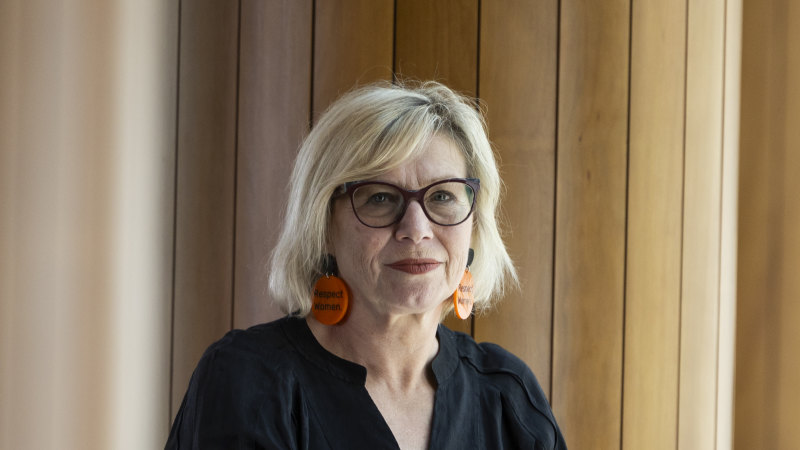Save articles for later
Add articles to your saved list and come back to them any time.
Nearly 10 years after her son Luke was killed by his father, Rosie Batty says it can feel like little has changed, with reports of women and children being murdered by their husbands, partners and fathers regularly in the media.
“When I sit in front of the news and I see there’s another fatality … I don’t think anything’s changing,” the former Australian of the Year said.
Former Australian of the Year Rosie Batty says work on preventing violence against women and children is hard and slow-going.Credit: Alex Ellinghausen
“I’ve been standing up in front of the Australian public for nearly 10 years: this is exhausting, it is overwhelming, and it is disheartening. When I first lost Luke, I didn’t realise how difficult and how long change would take.”
But she still believes ending violence against women and children is possible.
On Monday, she joined teal independents in Parliament House to mark the international 16 Days of Activism against Gender-based Violence campaign, which started on Saturday, and call for additional federal government funding and action.
Prime Minister Anthony Albanese also revealed he’d had his own experience with family violence in response to questions from the independents on the issue.
“I’m passionate about the issue of family and domestic violence and doing something about it because I know – I know the impact that it has. I have been there,” he said, without giving details about when in his life he had seen or experienced it.
Goldstein MP Zoe Daniel said 51 women had died this year as a result of intimate partner violence, and statistically another seven would be killed before Christmas.
“This, in my mind, is a national emergency,” Daniel said.
She acknowledged the government had done more work in the past 18 months than previous governments, including creating a national 10-year plan to end family and domestic violence, but said more funding was critical.
“The facts are before us. We have a plan. Let’s fund it in order to actually achieve the aims of the plan,” she said.
Asked about the issue in question time by Daniel and Warringah MP Zali Steggall on Monday, Albanese said he was proud of the work the government was doing and was determined to make a difference, but it was also a job for society at large.
“It is not just a matter of government, it is a matter of every bloke having a conversation at the pub, at the football, calling it out,” he said.
“Men have a responsibility, men are in a position to make a difference with their peers.”
Opposition Leader Peter Dutton supported Albanese’s comments.
“This is not an issue for point-scoring or political difference. The Australian public should hear there is no difference between either side, anybody in this chamber, in relation to this most serious issue,” he said.
Social Services Minister Amanda Rishworth said Australians were rightly shocked by the level of violence in the community and it remained a matter of urgency for the government.
“This violence has to end. And it’s why our government is committed to action and investment in this space,” she said.
Besides the national plan, Rishworth said the government had invested $2.3 billion in women’s safety initiatives, sped up access to financial and casework support for victims, and legislated 10 days of paid family and domestic violence leave for all workers.
The government was also developing ways to identify risks posed by perpetrators and support early intervention, and delivering confidential phone counselling for perpetrators who wanted to change their behaviour.
Last week, the government announced a statistical dashboard, to be launched mid-2024, which will update intimate partner homicide data every three months and help provide a full picture of the harm occurring across the country.
Respect Victoria chair Professor Kate Fitz-Gibbon said while data was important to detail the scale of the issue, focusing on prevention to ensure deaths did not happen was critical.
“We need a more concerted national commitment to preventing family homicide. We need to change the count,” she said.
Batty says there has been some progress, with conversations about violence against women and children now less stigmatised.
She said preventative campaigns would be crucial, as they had been for issues such as smoking or preventing skin cancer.
“I don’t talk in hope any more, I talk with a certainty: we are creating change right now,” Batty said.
For help in a crisis call 000. If you or anyone you know needs support, you can contact the National Sexual Assault, Domestic and Family Violence Counselling Service on 1800RESPECT (1800 737 732), Lifeline 131 114, or Beyond Blue 1300 224 636.
Cut through the noise of federal politics with news, views and expert analysis. Subscribers can sign up to our weekly Inside Politics newsletter.
Most Viewed in Politics
From our partners
Source: Read Full Article




